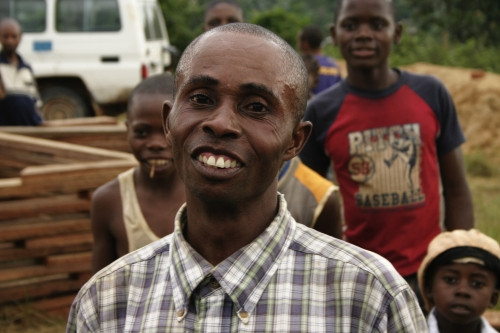Two Schools Built in DRC by PIN, Bricks Pressed by Parents and Headmaster
Published: Mar 8, 2012 Reading time: 4 minutes Share: Share an articlePrague (15 May, 2012) – Two new schools for 600 pupils have been opened in the east of Democratic Republic of the Congo. These schools, located in the villages of Amina and Kaboge in South Kivu province, were constructed, to a great extent, by the local community itself while being aided by People in Need and also by the Spanish Agency of International Cooperation (AECID and RESCATE).

The new six-classroom school buildings are equipped with blackboards, desks and chairs. Each classroom can accommodate fifty pupils. The villager people, who had been helping to build the schools, arrived at the inauguration ceremony where the pupils organized an impressive procession with palm leaves. The opening of the new schools was truly appreciated even by the chief representative of the Ministry of Education in South Kivu province.
Photos: new schools in D.R. Congo
The brick school buildings were erected next to the old ones, which had been put up by the villagers from cemented tree twigs and branches, stones and mud. In the past, after rain the children had to repair the school by themselves, thus it was not easy for them to concentrate on the tuition. Fourteen-year-old Aline Ombeni from Amina village describes the situation back then: “There were no desks or blackboards in the original school, and the rain was coming down through a hole in the roof.”
Her family also participated in constructing the new school building. “My mother was carrying sandbags, the father was digging up a pit for a cesspool, and I was helping too,” Aline, whose favourite subject is mathematics, depicts. According to Bita Bulambo, a headmaster in Kaboge, the new brick school will be virtually swarming with pupils. “I feel excited about the new school and I am looking forward to turning it officially into a public school. This will result in the increase of the pupils enrolled and our staff will finally get paid,” Bita Bulambo says.
Brick buildings in Democratic Republic of the Congo bring comfort to the pupils and their teachers as well as enhance the school's prestige among the officials. “Unless schools are built from durable materials, the government rarely pays the staff a salary,” the headmaster explains.
In fact, it was the whole community that had taken part in the construction. Even the headmaster and his wife lent a helping hand. The village people even pressed the bricks themselves. Irene Danysh, DR Congo Head of Programmes, says: “After the price of bricks in the area had risen twice, we took the plunge and organized teams that pressed the bricks themselves.” Although persistent rains together with delayed timber supplies made the construction complicated, everything turned out well in the end.
Moreover, the building process has firmly cemented the local community. “People contributed to the construction mainly by bringing sand and stones for the foundations, they were putting up sheds for the bricks, transporting material, and finally they got involved in pressing the bricks within the work teams,” says Irene Danysh while adding that the local leaders are the most active driving force. “We were lucky here in Kaboge since the headmaster was really pro-active and local authorities were very cooperative,” Irene Danysh praises.
In general, People in Need is striving for improving the general level of education in the district of Kitutu, and in total it is operating in 42 schools. “Besides the construction of two and the reconstruction of other ten schools, we are focusing on training of more than 200 teachers and inspectors,” Dana Plavcová, Regional Desk Officer for Africa, says. “We furnished our new schools with desks and blackboards. Expenses for school supplies in 16 schools were covered by the Real Gift, a charity e-shop,” she adds.
This project also focuses on raising public awareness of the importance of education. The local radio station is the most widespread medium of information in the area, plays regular promotional spots attracting attention to the benefits of education.
Education system in the Kitutu district in the east of Democratic Republic of the Congo:
The Kitutu district’s population is more than 100,000 people and there are 84 primary schools in total according to all available statistical data. Only eleven of them are state-run schools, the others are run by the church. In Kitutu only two thirds of children complete primary school successfully. The standard of education here is very low; the teachers are poorly educated (they have completed secondary school at best), they rarely have any teaching aids owing to extremely low salaries (an average teacher's salary is about 60 USD per month). On top of that, there is nothing that keeps them motivated at work. Most schools are not properly equipped – there are seldom any desks, blackboards or toilets.
For further information contact:
Dana Plavcová, Regional Desk Officer for Africa, +420 777 787 698
Jan Mrkvička, PIN Relief and Development Department Director, +420 777 787 961
